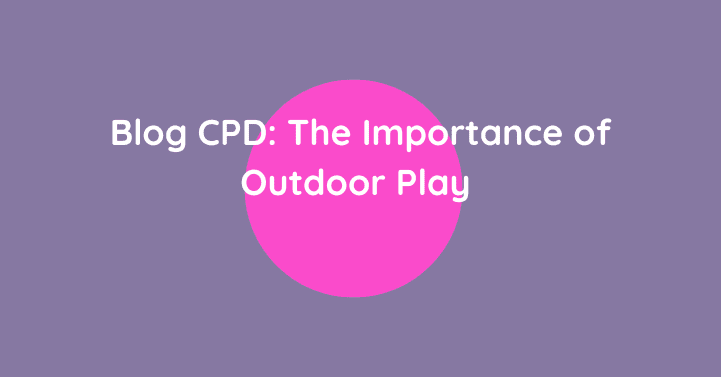CPD
The Importance of Outdoor Play
A Research-Informed Guide for Educators
With Muddy Puddle Teacher® Toolkit Guidance
1. Why Outdoor Play Matters
Outdoor play is not an optional extra; it is a vital part of children’s cognitive, physical and emotional development. Research consistently shows that children learn better, regulate better, and behave better when they spend regular time outdoors.
Key Research Insights
1. Improved focus and attention
-
Natural outdoor environments help children maintain attention for longer and reduce symptoms of inattention.
Evidence: Faber Taylor & Kuo (2009); Söderström et al. (2013)
2. Enhanced physical development
-
Outdoor play improves gross motor skills, coordination, and confidence in movement.
Evidence: Brussoni et al. (2015); Tremblay et al. (2015)
3. Better emotional wellbeing and reduced stress
-
Nature reduces cortisol levels and increases feelings of calmness and stability.
Evidence: Wells & Evans (2003); Kelz et al. (2013)
4. Increased social skills and cooperation
-
Outdoor spaces encourage collaboration, problem-solving and imaginative role-play.
Evidence: Sandseter & Sando (2016)
5. Strengthened learning outcomes across the curriculum
-
Hands-on outdoor experiences deepen understanding in science, literacy, maths, and geography.
Evidence: Rickinson et al. (2004)
2. Why It Matters for SEND Learners
Outdoor play is particularly powerful for children with additional needs.
Benefits for SEND Children
-
More space to move, reducing anxiety
-
Reduced sensory overload compared to indoor settings
-
Calming natural sensory input
-
Clearer boundaries and predictable routines
-
Higher engagement through movement and hands-on tasks
-
Opportunities for communication without pressure
Evidence:
-
Änggård (2011) on outdoor environments for neurodiverse learners
-
Barrable (2019) on nature-based SEND inclusion
-
Saito et al. (2020) on sensory benefits of natural play
3. What Does High-Quality Outdoor Play Look Like?
Outdoor play must be purposeful, varied, and accessible. Below are examples you can use immediately.
Types of Outdoor Play
1. Sensory Play
Using natural materials to stimulate touch, sound, smell and sight.
Examples: leaves, water, stones, sticks, mud, clay.
2. Imaginative Play
Creating stories, roles and scenarios outdoors.
Examples: building dens, role-play with natural props, small-world outdoor setups.
3. Physical Play
Supporting stability, coordination, mobility and confidence.
Examples: balancing on logs, climbing, crawling, throwing natural objects safely.
4. Exploratory Play
Hands-on investigation into real-world materials and environments.
Examples: puddle exploration, weather observations, insect watching, natural collections.
5. Social Play
Cooperative play that builds relationships.
Examples: group building tasks, outdoor problem-solving challenges.
4. Barriers to Outdoor Play — and How We Overcome Them
Common Barriers:
-
Weather concerns
-
Limited space
-
Lack of confidence
-
Perceived workload
-
Uncertainty around safety
Solutions:
-
Use the Muddy Puddle Teacher® Toolkit for simple, sustainable methods
-
Build routines: grab-and-go kits, weather expectations, simple boundaries
-
Start small, with one lesson a week
Evidence: Rickinson et al. (2004) — small, low-risk experiences build long-term confidence -
Remember: outdoor learning improves behaviour, wellbeing, and attention
5. The Muddy Puddle Teacher® Toolkit
Simple, sustainable, inclusive tools for outdoor learning
The toolkit uses natural, upcycled, low-cost resources that help you teach effectively outside without needing expensive equipment or elaborate setups.
Key Toolkit Methods
1. The Bamboo Method
-
Use bamboo sticks for measuring, shape-making, angles, boundaries, teamwork and creative design.
2. The Rope Method
-
Ideal for science, teamwork, sensory movement, investigations and safe boundary-setting.
3. The Clay Method
-
Supports fine motor skills, expression, 3D modelling, sensory regulation and creative curriculum tasks.
4. The Stick & Stone Method
-
Perfect for counting, phonics, sorting, sequencing, building and comparing.
5. The Puddle Play Method
-
Weather-based investigations, cause-and-effect, descriptive language, science concepts and sensory exploration.
6. The Upcycled Loose Parts Method
-
Use tyres, crates, fabric, tubes, pots, pans and more for construction, STEM tasks and imaginative play.
6. Practical Examples for Staff to Use
Curriculum Examples
-
Science: use ropes to measure shadows and explore forces
-
Maths: build shapes with bamboo sticks; count collections of leaves
-
Literacy: storytelling using natural objects as characters
-
Geography: map the playground using sticks and stones
-
Art: clay sculptures, bark rubbings, natural patterns
SEND-Adapted Examples
-
Calm sensory paths using leaves, stones and bark
-
Ground-level investigation trays for wheelchair users
-
Clay to support sensory regulation
-
Rope circles to provide clear personal space
-
Natural textures for sensory exploration
7. Why Upcycled and Natural Resources Work
Research shows that open-ended, multi-sensory materials promote deeper learning, creativity, and self-regulation (Nicholson’s Theory of Loose Parts, 1971).
Natural materials offer:
-
Unlimited variation
-
Strong sensory feedback
-
Low cost
-
Eco-friendly sustainability
-
Adaptability for SEND learners
The Muddy Puddle Teacher® Programme builds on this evidence with structured, practical methods.
8. Reflection Questions for Staff
Use these to guide personal or team reflection:
-
How often do we take learning outdoors — and what is stopping us doing more?
-
Which groups of children benefit most from outdoor learning in our setting?
-
How could we incorporate one Muddy Puddle Teacher® Toolkit method this week?
-
What natural or upcycled resources do we already have access to?
-
How could outdoor learning reduce behaviour or wellbeing concerns?
9. Next Steps
Continue growing your outdoor learning practice with:
-
The Muddy Puddle Teacher® Level 1–4 Programme
-
Our online training packages
-
Workshops and UK tour events
-
Free demonstrations on TikTok, Instagram and Facebook
For more support or training bookings:
info@themuddypuddleteacher.co.uk


